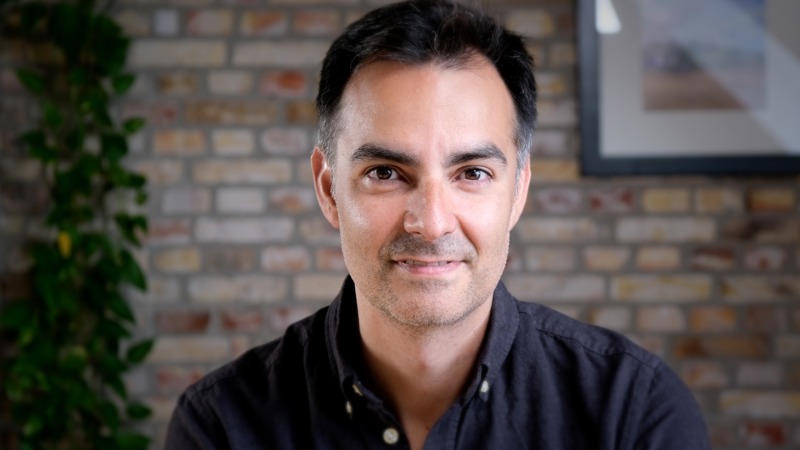4 major trends: Fintech gives an indication of the future of financial jobs
“Four major trends are worth keeping an eye on, wherever you work in the financial sector”, explains Chris Crespo, futurist and program manager for Nordic Fintech Week in September.
There is good reason to keep an eye on fintech – no matter where you work in the financial sector.
“Fintech plays an absolutely central role in the transformation of the financial sector that is underway and that will intensify in the coming years”, states Chris Crespo, futurist and program manager for Nordic Fintech Week, which is held in Copenhagen from 27 to 28 September.
A little understanding of fintech is thus a key to spotting future business areas and job opportunities. It is an important demonstration of what competitors and business partners are already up to, and a valuable insight into some of the financial services and products that customers are increasingly looking for.

But this does not mean that all financial employees have to work with technology”, Chris Crespo emphasises:
“On the contrary, technology gives you more time to use your expertise on the tasks you are best at. Not on the repetitive and boring stuff”.
Spotify and Netflix lead the way
Chris Crespo, who is also responsible for the content of Nordic Fintech Magazine, keeps a sharp eye out for trends in the industry that unite finance and technology.
Learn more about the jobs of the future
Members of Finansforbundet can participate in Nordic Fintech Week for DKK 500. For others, the price is around DKK 5,000. Learn more here
Hear Chris Crespo present Nordic Fintech Week and talk about the trends in financial technology in 5 short videos here
At the moment, it is outside forces that determine the direction, he notes:
“Consumers have become accustomed to Spotify, Netflix and other services with simple operation and personalised options. They therefore expect the same from their bank and other services in the financial sector”.
This development is very much about backend technology, which covers both systems with new functionality and more flexible and scalable infrastructure. This gives financial companies new opportunities to focus on select core competencies and let others take care of the technology instead of running a traditional data centre themselves”, explains Chris Crespo.
He points to two examples from other industries to illustrate the development:
“Many people perceive BMW and Nike as companies that manufacture cars and shoes. But in reality they are skilled marketing companies that sell cars and shoes. They buy virtually everything else from external suppliers. Financial companies will also increasingly take advantage of this modular approach”.
Four major trends
The Nordic Fintech Week 2022 program focuses on four dominant trends”, says Chris Crespo.
Currently and in the near future, this applies to embedded finance and ethical finance:
1. Embedded finance
With this, financial services are taken out of banks and into other industries. We are already familiar with it in the form of buy-now-pay-later loans, where a pizza purchase can be paid off over four instalments. But there is a much larger market for products that combine easily accessible solutions and frictionless payment for customers. There are many business opportunities for banks and companies in other industries – and a need for both advice and business understanding.
2. Ethical finance
Fintech can handle data processing that ensures sustainability in the financial field. The development here is mainly driven by regulation (SFDR, NFDR and EU taxonomy) and development goals such as SDG (Sustainable Development Goals) and ESG (Environment, Society and Management). Amongst other things, fintech is developing new methods for verification, ‘product declaration’ and comparing financial products and actors. This frees up working time for core financial services rather than forced verification tasks.
In the longer term, the trends include democratisation of finance and the future of financial services:
3. Democratisation of finance
It used to require a fortune to invest. Today, everyone can come to the table – thanks to technologies that have made it simple and cheap. New social trends in society will increase the need for flexible wealth products, micro-investment opportunities, crowd funding, crowd sourcing etc. There are big market opportunities here because many more people will invest in different ways. This includes the growing group of people who want to work less and/or retire early. The need for tailored financial advice will also increase. Robots and artificial intelligence cannot do the job alone.
4. The future of financial services and products
Easy, convenient and transparent. Financial services should be easy to access and customers will be clearly informed about prices, fees etc. Customers should like their financial service provider(s). Trust is not enough – it’s no longer the bank, but the system and legislation behind it that the customers trust.
The integration between online and offline also plays an important role: the customers will be able to choose for themselves whether they interact with the bank via app, phone, chat, video or face-to-face. The tech solutions of the future must therefore play smoothly together with the real world.
And then there are all the alternatives with a completely different basis than the traditional centralised and regulated financial institutions: Decentralised finance, blockchain infrastructure, cryptocurrency, tokenization and virtual worlds like the Metaverse. The traditional financial world has rejected and been wary of alternative competitors, but there is an increasing interest in integrating some of the products and services that customers demand.
The Nordic countries can do something special
“In any case, it’s wise to familiarise yourself with what’s going on with your opponents and fellow players”, says Chris Crespo.
In his previous job as Chief Futurist at Nordea, he once did a live performance where he registered as a customer and ordered a payment card from the British app bank Revolut in just a few minutes.
“It was an eye opener to experience how simple it was and to recognise the competition from the new tech-based banks”.
Nordic Fintech Week is an ideal opportunity to get updated on what is going on in financial technology in Scandinavia and the rest of the world. The program offers presentations, debates and showcases and the opportunity to mingle more informally with fintech companies, investors, enthusiasts and experts.
According to Chris Crespo, there are several reasons why the Fintech environment in Scandinavia is innovative, has a commercial impact and is getting attention from all over the world:
“This is a society with a high degree of digitisation and a high level of education in both finance and technology. A high degree of trust in central institutions and regulated companies also plays a role. The same is true of the region’s social safety nets and various forms of support schemes for start-up companies. This is why the Nordic countries are world champions in creating unique, functional, simple and elegant solutions – just as we’ve seen from Danish design”.





